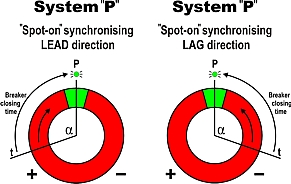Description
The digitally controlled KSQ104x2 provides both visual presentation of voltage differential and relative speed and phase angle relationship and speed control output signals necessary to achieve fast automatic "spot-on" synchronising between two systems. KSQ104x2 is a direct replacement for the “traditional” KSQ104 and KSQ105.
Its many important features contribute to make KSQ104x2 simply the best choice available for synchronising in any automatic generator control system (PM-system).
KSQ104F2 is the standard and it takes the auxiliary voltage from the monitored voltage on terminal 3 & 4.
KSQ104G2 have separate auxiliary supply on terminal 19 & 20.
Applications
KSQ104x2 is used for both single and three phase systems. Any two phases (or phase-neutral) can be used for synchronising as long as they are the same two phases on both sides of the breaker. The synchroniser is rated for continuous operation and can be left connected when not in use.
Synchronising modes
To adapt the functionality of KSQ104x2 to any specific application, the direction of approach to synchronising (LEAD, LAG or NEUTRAL) can be selected as required:
- LEAD (incomer faster than bus)
- LAG (incomer slower than bus)
- NEUTRAL (bi-directional)
LEAD is generally the preferred mode. The synchronising relay will then operate when the frequency of the incomer is slightly HIGHER than the bus frequency. This is to avoid motoring of the incomer (entering reverse power condition) after the breaker is closed.
The rotary LED display and the direction of the yellow arrows indicate the incomer's speed relative to the bus. The rotary display is not lit if frequency difference between systems exceeds 5Hz.
Speed control
The raise/lower relays pulses the fuel control governor motor, or an interfacing MXR845x electronic potentiometer. Pulse length and rate of the speed control relays are adjusted on the rear of the unit to suit the dynamic response of any engine regulator. The speed control has a P/I (proportional/integral) characteristic, with a dynamically controlled dead zone.
Alternatively the linear analogue -10/0/+10mA output signal can be used as speed reference to a generator controller, with polarity and amplitude proportional to frequency difference between the two systems when synchronising mode is selected.
System status:
KSQ104x2 is fitted with a system status relay. As standard the unit is powered from generator side (terminal 3 & 4), when power is ok and unit is working correctly the relay activates. It will release on alarm or when unit is not powered. Separate auxiliary supply is needed for continuously system status.
Normal operation : Closed contact
Alarm condition/unpowered : Open contact
"SPOT ON" synchronisation - CB closing time compensation
The dynamically controlled CB closing time compensation provides SMOOTH
synchronising, avoiding the engine/generator couplings being exposed to
excessive torque forces. If FAST synchronisation is the priority,
accurate "SPOT-ON" synchronising will still be maintained even with a
large frequency difference between the power sources.
The System "P" synchronising principle
The relay closure is initiated at "T" when the breaker coil is energised
and finalises at "P", assuring a precise "12 o'clock" synchronisation
(figs 1 and 2). Allowed frequency difference is adjustable between 0.1Hz
and 2Hz.
Typical setting for smooth synchronising is 0,2Hz. The angle "a" varies
according to the calculated frequency difference between the two
systems. The synchroniser operation and accuracy is not influenced by
distorted voltage waveforms or harmonics.
Synchronisation
Green lamps indicate voltage presence on reference source (BUS PWR) and
incoming generator (GEN PWR). Green lamps also indicate that the voltage
and frequency differentials between the two systems are within the
limits. The synchronising relay will close when the above conditions are
achieved.
A green lamp (CB close) indicates the close command to the breaker.
Frequency difference and voltage limits, circuit breaker closing time,
speed control relays pulse length/rate and synchronising mode are user
settable on the front of the unit.
Note: The CB Close LED will flash when unit is ready for
synchronising, but inhibit input is open or synchronising mode is not
selected.